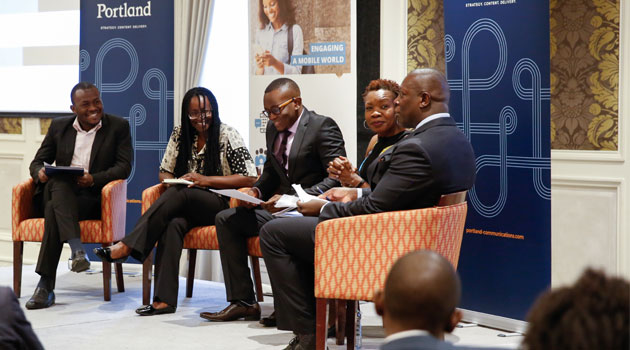
Portland and GeoPoll hosted a panel discussion on the reality of fake news in Kenya on Wednesday/COURTESY
NAIROBI, Kenya, Jul 20 – “A lie can travel halfway around the world while the truth is putting on its shoes,” a quote attributed to Mark Twain accurately describes the dilemma of “fake news” and how fast it travels.
With the explosion of social media in Kenya where about 10 million Whatsapp users exist and mobile penetration is up to 87 per cent of Kenya’s 44 million population, like fire, access to information can be a good servant and a terrible master also.
In a report titled The Reality of Fake News in Kenya done by Portland Communications in collaboration with GeoPoll, around 90 per cent of Kenyans have seen or heard false news about the upcoming General Election.
Also, 49 per cent of Kenyans are receiving news about the General Election through social media which enjoys a low confidence rate as compared to radio, television and newspaper according to the report.
Alphonce Shiundu, Kenyan editor for Africa Check admits that the problem of fake news is an emerging one and dealing with it is still work in progress.
“Right now, I can say that this area is still a work in progress. Sadly the law of incorrect tweets comes into play; the correction usually never catches up,” he said.
He pointed out that there are numerous ways of telling fake news from the authentic news.
“Look at the source first. Is it authentic? By reading the about section, you can tell whether a website is credible or not,” he said.
He, however, believes that consumers can call out fake news if they just paid more attention.
“We ask people to try and read the full story and not just stop at the headline. The author of the story has to have a name. For example, if the author lists the university or institution he/she serves in, you can search the website and find out if it’s true,” he said.
“You can also call in the experts e.g. Africa Check and verify,” he added.
While fake news carries with it consequences, in extreme cases, Shiundu says that lives can be lost.
“When Leonard Mambo Mbotela was killed by social media, a relative fainted when they received the news,” Shiundu said.
“In some extreme cases, fake news can lead to loss of life. Someone can get killed, it can start a fight and injure someone,” he added.
He is also worried about the effect of fake news on policy formulation.
“Also, we might have a problem with policy formulation. Remember that policy makers rely on information,” he noted.
“The risk of misinformation where you have an ignorant public is also possible. You end up spreading myths and prejudices against other people,” he quipped.
Shiundu is not the only one who is worried about the effects of fake news on decision making.
Robert Watkinson, a partner at Portland, noted that “…with 4 in 10 Kenyans unable to access accurate information about the General Election, fake news is clearly a limiting factor in the electorate’s ability to make informed decisions.”
On images and videos Shiundu says that there are numerous tools that can be used to identify fake or authentic news.
“When you see a questionable image, there is a tool called Google reverse search. Run the image and see where it was published first,” he said while adding that “a tool called frame by frame can help you achieve a forensic analysis of a video.”
– Journalistic responsibility –
Shiundu noted that journalists can play an important role in the era of fake news by verifying information, reporting accurately and honestly.
“The primary work of a journalist is to verify information, report accurately and honestly,” he noted.
Allan Kamau, Head of Portland Nairobi says that hope is not lost at all because Kenyans can spot false news.
“While the fake news is evidently now a core part of the news mix in Kenya, reassuringly, our study found that Kenyans are already well attuned to spotting false information,” he noted in a press release.
“Respondents cited conflicting data, controversial messages and biased reporting as the top factors that lead them to suspect something is false. Getting even more sophisticated about spotting and tackling fake news will be vital in ensuring that credible news sources can maintain levels of trust,” he added.
As the battle of fake versus authentic news rages on, Jonathan Swift’s writing in “The Examiner” newspaper in 1710 rings loud.
“But the lie had its seven-league boots on a week ago, and here is the truth just rubbing its sleepy eyes and preparing to give it a lazy chase,” he wrote.









































